

With the success and open-endedness of
The Wrath of Khan, the
Star Trek movie franchise had basically a three-part story on its hands, the second of which would feature, despite his reluctance to continue or reprise the role, the return of Spock and his “resurrection” after his harrowing and emotional death at the end of the previous movie. Initially intended to have been a permanent death, the fan outcry at the killing off of their hero was such that both writers and actor bowed to pressure, the latter only agreeing to play the part if he were allowed direct the movie.
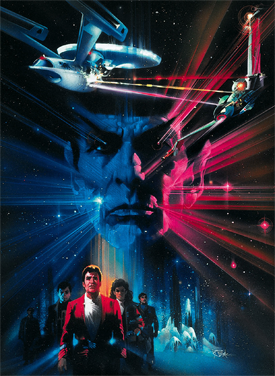 Title: Star Trek III: The Search for Spock
Released:
Title: Star Trek III: The Search for Spock
Released: 1984
Writer(s): Harve Bennett
Director: Leonard Nimoy
Starring: All the usual Star Trek crew plus: Mark Lenard as Sarek, Merritt Butrick as David Marcus, Christopher Lloyd as Kruge, Robin Curtis as Saavik and James B. Sikking as Captain Styles
Runtime: 105 minutes
Budget: USD 16 million
Boxoffice: USD 87 million
Critical acclaim: Extremely high
Fan acclaim: Extremely high
Legacy: Brought Spock back from the dead, final voyage for NCC-1701
Enterprise: NCC-1701
We pick up exactly where the second movie left off, as
Enterprise limps back home after having defeated Khan, and with Spock dead. Lieutenant Saavik and David Marcus have stayed behind on the newly-formed Genesis planet to survey it. Meanwhile, a shifty character has sold the Genesis data to a Klingon woman, who now transmits it to her lover, Kruge. He then destroys the ship she is in, along with the traitor, and heads for the Neutral Zone.
Enterprise arrives home, and as they dock Chekov alerts Kirk to the fact that the door to Spock’s quarters has been forced, after the captain had ordered it sealed, and that a life energy reading is being detected there! Rushing down, Kirk finds McCoy sitting there, seemingly in a trance. He emulates Spock’s voice and asks Kirk to take him home. When Kirk says they are home it becomes clear he means Vulcan, not Earth, and that somehow the dead Spock is talking through Doctor McCoy, who then collapses.
Kirk and the others are dismayed to find that the
Enterprise is to be decommissioned, Starfleet believing it is too old and has had its day. They are also told that the Genesis Planet is off-limits, as ordered by the Federation High Council. Scotty is seconded to the
Excelsior as head of engineering, and goes with bad grace. Kruge meanwhile sets course for the Genesis Planet, intent on discovering the secret of this new, as he sees it, Federation weapon. Saavik and David, onboard the USS
Grissom which is surveying the planet, locate the torpedo tube which was used to eject Spock’s body into space, but are intrigued to see that there is a lifeform registering in the area. They decide to beam down to investigate. Sarek, Spock’s father and Vulcan ambassador, visits Kirk and berates him for having left his son behind. Spock trusted him, he tells the captain, to bring his body back to Vulcan, where his
katra, his spirit, his soul, could be regenerated. Sarek finds it unbelievable that Spock did not make this request to Kirk, his closest friend and the one who saw him last. After mind-melding with him though, Sarek sees that this is not the case. Kirk points out that they could not touch, that glass separated them, so Spock could not have mind-melded with him. Sarek sighs, saying that in that case, all is lost. Spock’s
katra is gone, and his second chance at life has vanished.
But Kirk is not prepared to give up so easily. If it was that important, he says, Spock would have found a way. Reviewing the tapes of the incidents leading up to Spock’s death, he and Sarek see Spock place his palm on McCoy’s face and say “Remember”, and they known now that the Vulcan must have mind-melded with the doctor. Sarek says that in order to separate the two, Spock’s
katra from McCoy’s brain, he must bring Spock’s body with McCoy to Vulcan. This will not be easy, as they have just been advised a) their ship is to fly no more missions and b) the Genesis planet is off-limits, but Kirk determines to ensure he performs this one last service for his friend.
On the planet’s surface Saavik and David find the source of their lifeform readings: microbes which were o n the surface of the torpedo tube when it was launched have grown and mutated under the Genesis effect. But they also find the empty burial robe of Spock: his body is nowhere to be seen. The planet appears to be going through some sort of tectonic activity, as tremors shake it. Then a voice pierces the air, a roar of something in pain. Meanwhile, Kirk springs McCoy, whose odd behaviour and an attempt to charter a ship to the Genesis planet has constrained Federation Security to place him in holding. He and the crew then “appropriate” the
Enterprise and take it to the Genesis planet. The
Excelsior, sent to pursue it, suffers something of a mental breakdown thanks to Scotty’s tinkering while stationed there and is left behind. On the planet Saavik and David find a Vulcan child, whom they believe to be Spock, regenerated by the Genesis effect. She recommends they beam back up, but before that can happen Kruge’s ship appears and destroys the
Grissom.
He is annoyed however, as he had intended to take prisoners. When lifesigns are detected on the planet below, he sends a landing party and takes the three prisoner. David reveals that he used proto-matter, a substance that is prohibited or at least that all ethical scientists have denounced as “dangerously unpredictable” in the Genesis Device, and he believes this is why the planet is now tearing itself apart. Genesis, it would seem, is something of a failure. The Spock child, too, is ageing rapidly, turning from a small boy to a teenager in the space of a few hours. His instability seems to be mirrored in that of the planet, as if the two have some kind of psychic connection. Saavik worries that he will soon face
Pon Farr, and is not prepared for the Vulcan blood ritual. Kirk is concerned that there has been no reply to his hail from the
Grissom, and wonders if the captain will join him or try to turn him in, as the admiral and all his crew are now fugitives from Starfleet. He is unaware that the science vessel is not answering because it has been destroyed.
As Spock begins to go through
Pon Farr the planet seems to rage with him, and when the
Enterprise encounters Kruge’s Bird of Prey they are able to partially disable it, but as Scotty did not anticipate a combat situation their few shots have knocked out the power for the shields. As the two ships hang in space, each badly damaged but trying to bluff it out and force the surrender of the other, Kruge plays his trump card, and tells Kirk he has prisoners on the planet. If the admiral does not surrender, he will kill them, and to show he is not bluffing he tells his soldiers to pick one of the three to kill now. The Klingon goes to kill Saavik, but David attacks him and ends up becoming the victim. Kirk is crushed to hear that his son is dead. To save the rest of the prisoners though he agrees to surrender his ship, but starts the self-destruct sequence before his crew is beamed to the Klingons hip and he himself beams down to the Genesis Planet. When Kruge’s people beam over the
Enterprise explodes, taking them with it.
Reunited with Saavik and the young-but-ageing Spock, Kirk contacts Kruge, taunting him that he has the secret he has been looking for, and Kruge beams down. As the planet tears itself apart they fight, until eventually Kirk is victorious and they trick the crew of Kruge’s ship into beaming them aboard, whereupon they take over the ship. Setting course for Vulcan, they deliver Spock to the priests there, also meeting Uhura and Sarek. The procedure for merging his
katra with his body is a dangerous one, and by no means certain to succeed. But of course it does, and Spock is reborn.
The human adventure, as it says at the end, continues.
QUOTES
Kirk (to log): “The
Enterprise feels like a house with all the children gone; no, more empty even than that.The death of Spock is like an open wound, and it seems that I have left the noblest part of myself back there, on that newborn planet.”
Kirk: “How much refit time before we can take her out again?”
Scott: “Eight weeks, Sir. But ye don’t have eight weeks so I’ll do it in two.”
Kirk: “Mr. Scott, have you always multiplied your repair estimates by a factor of four?”
Scott: “Certainly, Sir. How else can I keep my reputation as a miracle worker?”
Valkris: “Transmission sent. You will find it most useful.”
Kruge: “Then you have seen it?”
Valrkris: “I have, my lord.”
Kruge: “Unfortunate.”
Valrkis: “Understood. Success, my lord. And my love.”
Kruge: “You will be remembered with honour.”
Kirk: “My friends, the great experiment:
Excelsior!”
Sulu: “She’s supposed to have transwarp drive.”
Scott: “Aye. And if my grandmother had wheels she’d be a wagon!”
Kruge: “Oh yes, new cities, homes in the country, your woman at your side, children playing at your feet. And overhead, fluttering in the breeze, the flag of the Federation! Charming!”
Sulu: “The word, Sir?”
Kirk: “The word is no. I am therefore going anyway.”
McCoy: “How much and how soon?”
Alien: “How soon is now. How much is where?”
McCoy: “Somewhere in the Mutara sector.”
Alien: “Oh! Mutara is restricted! Cost permits many, money more.”
McCoy: “There aren’t going to be any damned permits! How can you get a permit to do a damned illegal thing? Look: price you name, money I got.”
Alien: “Place you name, money I name or else bargain no.”
McCoy: “Alright then dammit! Genesis! The name of the place we’re going to is Genesis!”
Alien: “Genesis?”
McCoy: “Yes! Genesis! How can you be deaf with ears like that?”
Guard: “Make it quick Admiral: they’re moving him to the Federation funny farm soon.”
Kirk: “Yes, poor fellow. I hear he’s fruity as a nutcake!”
Kirk: “You’re suffering from a Vulcan mind-meld, Doctor.”
McCoy: “That green-blooded son of a bitch! It’s his revenge for all those arguments he lost!”
Kirk: “Unit two, this is unit one. The
Kobyashi Maru has set sail for the promised land.”
Kirk: “NOW, Scotty!”
Scott: “Sir?”
Kirk: “The doors, Mr. Scott!”
Scott: “Aye, sir. I’m workin’ on it!”
Kirk: “Good work, Mister Scott.”
Scott: “The more they improve the plumbing, the easier it is to stop up the drains!”
Kirk: “Gentlemen, your work today has been outstanding, and I intend to recommend you all for promotion. In whatever fleet we end up serving…”
Saavik: “How many have paid the price for your impatience? How many have died? How much damage have you done? And what is yet to come?”
(Tune in next week to find out!)
Kirk: “You Klingon bastards! You killed my son!”
(This is a watershed moment for Kirk. He has never trusted Klingons but has up to now not really had any reason to hate them. Now, his fury and grief will carry him through three more movies, culminating in his heartfelt wish to see the entire race die. It’s hard to be sympathetic when your own flesh and blood has been murdered by these people).
Kruge: “Genesis! I want it!”
Kirk: “Beam the Vulcan up and we’ll talk.”
Kruge: “Give me what I want, and I’ll consider it.”
Kirk: “You fool! Look around you! The planet’s destroying itself! If we don’t help each other we’ll die!”
Kruge: “Perfect! Then that is how it shall be!”
Kirk: “Help us or die!”
Klingon: “I do not deserve to live.”
Kirk: “Fine. I’ll kill you later.”
Spock: “My father says that you have been my friend, that you came back for me.”
Kirk: “You’d have done the same.”
Spock: “Why would you do this?”
Kirk: “Because the needs of the one outweigh the needs of the many.”
Memorable scenes and effects
The self-destruct scene of the
Enterprise is both effective, moving and slightly humourous as the Klingons report “There is nothing on board but someone speaking”, this being the computer counting down to the self-destruct. But the scenes as the ship tears itself apart and slowly descends into the atmosphere of the equally doomed Genesis planet raise a lump in the throat. After all, we’ve seen this ship ply its way through space for over twenty years now, on and off, and somehow we’ve just never expected to see it destroyed. It’s the end of an era, and further proof that within the film franchise, the series is growing up and facing the hard questions, taking the tough decisions.
The scene where Kirk finds David’s body and covers it with his jacket is also very touching.
Spock’s rebirth scene on Vulcan is really well done too. The wearing of the white robe to signify, presumably, a new life, the officiating of a high-profile Vulcan high priestess mirrors what happened in “Amok time”, though the ritual was of course different, and the sense of ceremony without real emotion and the overarching logic, which temporarily gives way to the stronger feelings and beliefs of a father for his lost son, is carried out well.
Kirk’s hubris
To be fair, there’s not that much this time around. After two movies, Kirk has learned his lesson. He’s older, wiser and sadder. It’s like with the death of Spock, much of the fight has been knocked out of him and he is almost like an old man who allows himself to be led without resistance. Which for Kirk means listening to what his crew says and not second-guessing them, and using this procedure most of his decisions seem to be the right ones. The only time he guesses wrong is when he challenges Kruge to beam him up from the planet to get “the secret of Genesis” (which sort of echoes his taunt to Khan in the previous film, when they were marooned on Regula) and the Klingon decides instead to beam down and beat it out of him. Oops!
Those clever little touches
The captain of the
Grissom is called Esteban, his initials being J.T., obviously a nod to Kirk.
When McCoy is being arrested by Federation Security, he tries to nerve pinch the guard. Of course, being only human he cannot do this, but obviously Spock’s mind does not realise it is not in its own body.
When Kirk hears the news about the death of his son, he staggers backwards and goes to sit down but misses the chair, just as someone who had received a terrible shock would do. I’m not sure if it was planned, but either way it’s very authentic and gives a sense of reality to the scene.
It’s good too, how when he fights Kruge, the climactic scene takes place on an outcrop of rock overlooking a burning, molten chasm. Kirk is staggering on the precipice of his own personal hell, dealing with the death of two of the most important people in his life, and he’s about to exact vengeance for the death of at least one of them. Couldn’t be more symbolic. It’s also interesting how Genesis becomes Hell (Genesis to Revelation?) and how Kirk literally saves Spock (and himself) from Hell at the very last moment by beaming off the doomed planet.
I like, too, how the place of Spock’s rebirth on Vulcan is another high promontory, a cliff which resembles the one off which Kruge was kicked by Kirk and from which Spock was then rescued.
Questions?
Where is Carol Marcus? In
The Wrath of Khan we are given to understand that the Genesis Project is her baby, with David only helping her. It is, after all, she who makes the proposal to the Federation, and she who must have had the last word as to who they would work with, as her son has reservations about getting in bed with Starfleet. But here it’s David who is in charge, and Carol is not mentioned once, not even by Kirk. Are we supposed to believe she forgot about the whole thing? Is she answering delicate Starfleet questions? Is she under arrest? Is she now working covertly for the Federation on other projects? Nothing is ever said, and it’s something of a large omission I feel, given that so much of the second movie revolved around her.
Why does Kruge’s henchman, when told to kill one of the prisoners --- he doesn’t care which --- circle around until he is behind them and then strike? Klingons are supposed to be honourable warriors: is this any way to behave? Attacking someone from behind? And an unarmed victim too?
Parallels
Without meaning to offend any hardline Christians here, the rebirth of Spock obviously mirrors the resurrection of Jesus, right down to his empty coffin being found on the Genesis planet. The factions warring over the --- eventually proven to be faulty and therefore useless --- Genesis technology harks back to the arms race between the superpowers, and in a small way there’s a nod to the godawful “Spock’s brain”, where the Vulcan’s brain is literally stolen from his head by aliens and Kirk and McCoy have to go in pursuit of it to save their friend. I’m not joking, you know I’m not! Parallels too of course to “Amok time”, where we first see the planet Vulcan and learn of its inhabitants’ spiritual beliefs, which almost seem at odds with logic.
And isn’t that….?
Although she reprised her role as Janice Rand in the first movie, Grace Lee Whitney is in a very brief scene near the beginning here, in a very bad wig, and not named. She is the woman who watches the
Enterprise return, damaged but victorious, to spacedock.
Boston Legal’s John Larroquette is Maltz, the Klingon transportation chief on Kruge’s ship.












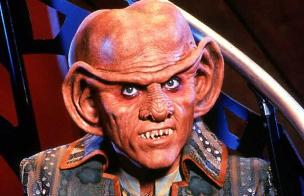




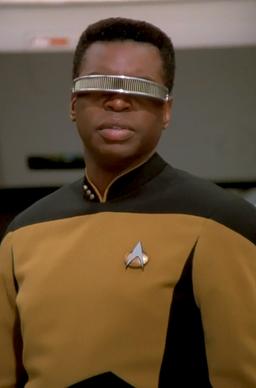
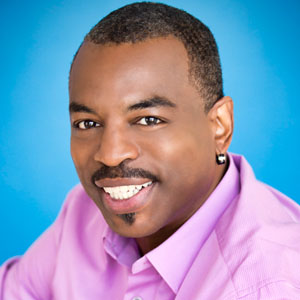

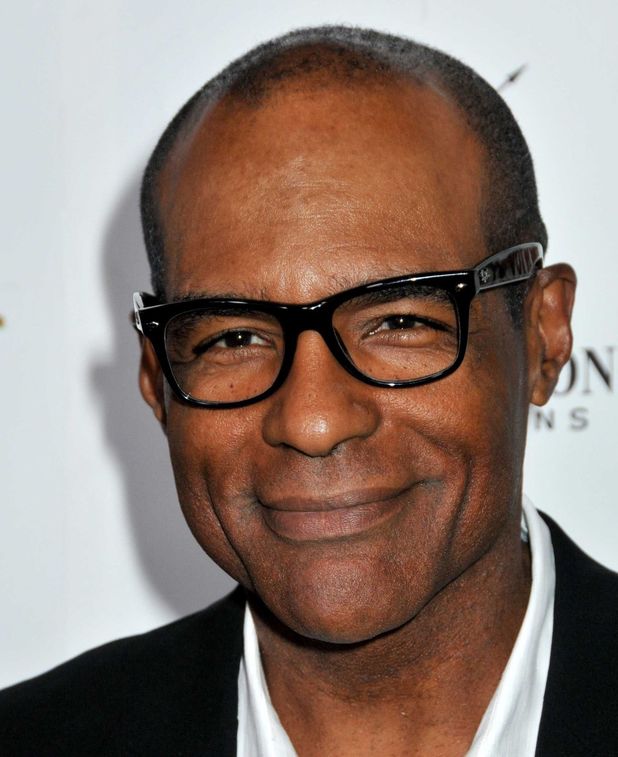


 Linear Mode
Linear Mode
